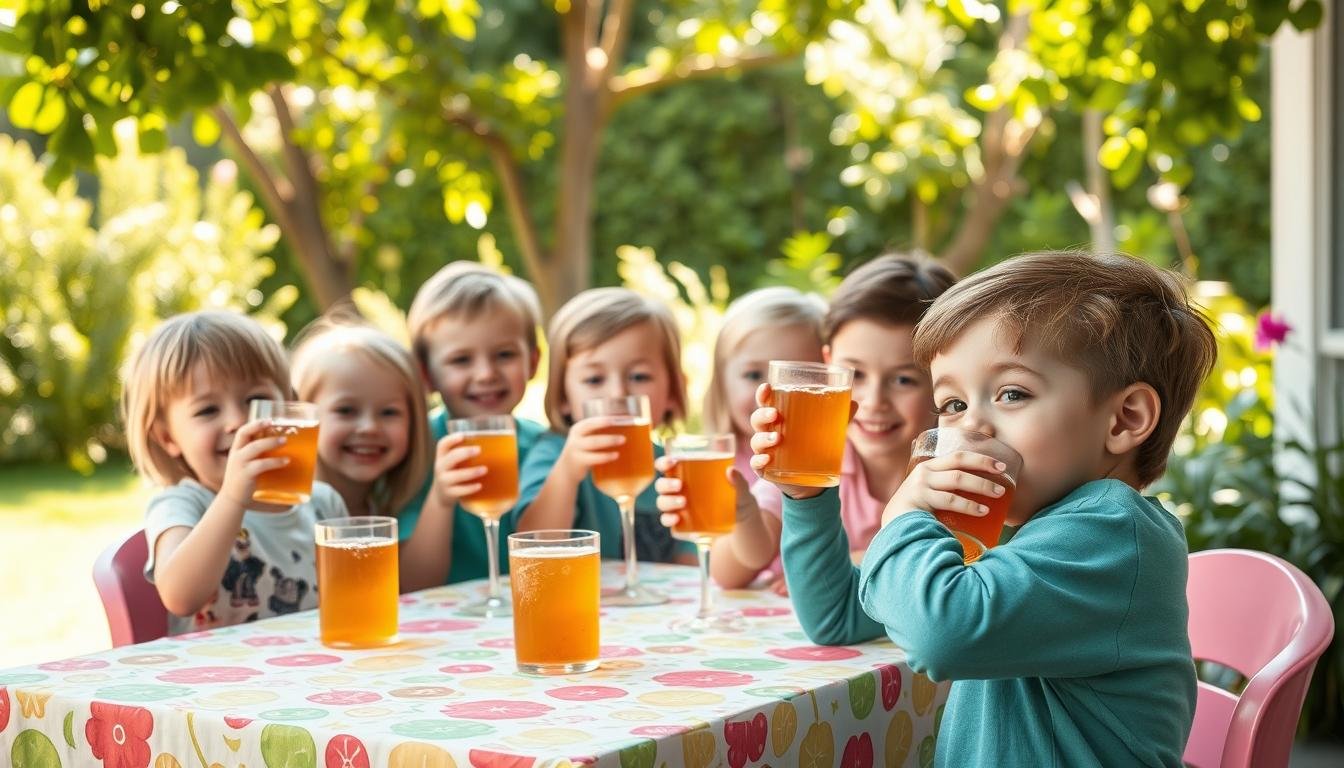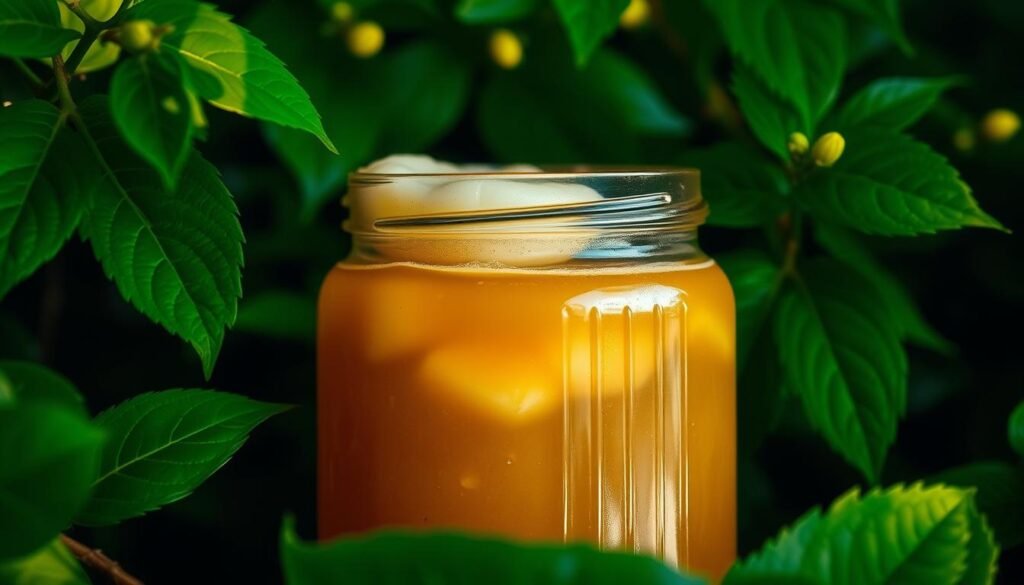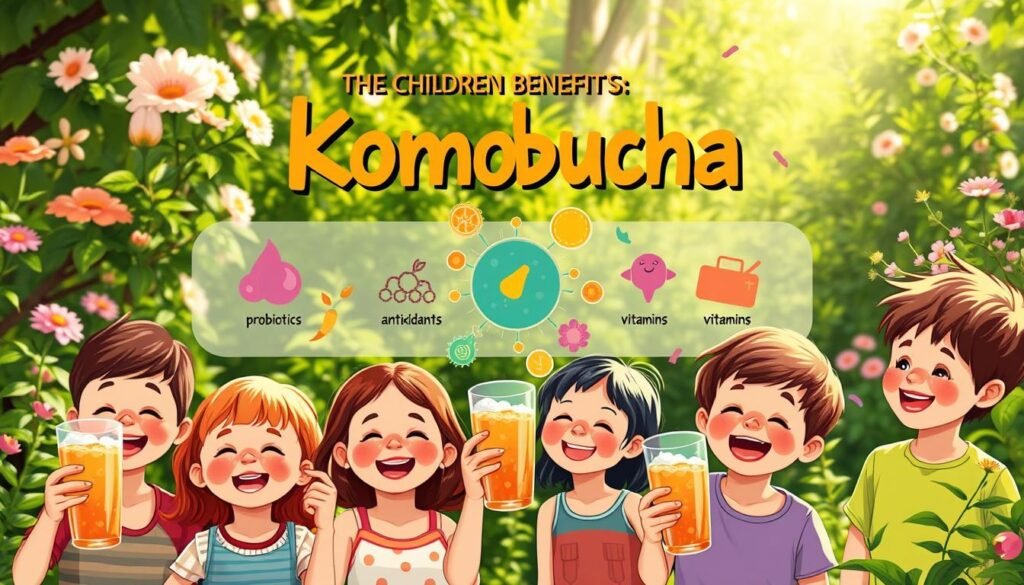Is kombucha a safe and healthy choice for children? This fizzy, fermented tea has gained popularity as a low-sugar alternative to sodas and juices. Parents often wonder if it’s suitable for their little ones. With brands like Equinox and RISE Kombucha marketing specifically to families, it’s worth exploring the facts.
Kombucha contains probiotics that may support gut health and boost the immune system. However, concerns about trace alcohol, caffeine, and sugar levels are valid. For example, Equinox Kombucha has 3g of sugar per 100ml, compared to Fanta Orange’s 4.6g. NHS guidelines recommend 19g of daily sugar for ages 4-6 and 24g for ages 7-10, making kombucha an appealing option.
Understanding the benefits and risks is crucial for parents. This article dives into safety precautions, age-appropriate serving sizes, and how kombucha compares to other beverages. Let’s explore whether this trendy drink fits into a child’s diet.
Key Takeaways
- Kombucha is a fermented tea with probiotics that may support gut health.
- It contains less sugar than many sodas, making it a healthier alternative.
- Trace alcohol and caffeine levels are concerns for children.
- Brands like Equinox and RISE Kombucha cater to families.
- Always consider age-appropriate serving sizes and safety precautions.
What Is Kombucha?
Kombucha is a fermented beverage with a rich history and unique brewing process. Originating over 2,000 years ago, this fizzy drink is made by fermenting sweetened tea with a symbiotic culture of bacteria and yeast (SCOBY). The result is a tangy, slightly effervescent drink packed with probiotics and other beneficial compounds.
The Fermentation Process
The fermentation process is the heart of kombucha production. A SCOBY, often called the “mother,” consumes sugar over 7 to 14 days. This process breaks down the sugar into organic acids, carbon dioxide, and trace amounts of alcohol. The result is a raw, unpasteurized beverage rich in live cultures.
During fermentation, the SCOBY produces probiotics, which are beneficial for gut health. It also creates gluconic acid, known for its detoxifying properties. The tea used in kombucha, whether black or green, contributes antioxidants that support the immune system.
Key Ingredients in Kombucha
Traditional kombucha recipes include three main ingredients: tea, sugar, and a SCOBY. Black or green tea provides the base, while organic cane sugar fuels the fermentation. Flavorings like elderflower, berries, or ginger are often added for variety.
Commercial brands like RISE Kombucha emphasize strict alcohol testing to ensure levels remain below 0.5%. Homemade batches, however, can sometimes reach 3-5% alcohol due to less controlled conditions. This is an important consideration for those brewing at home.
While kombucha offers health benefits, it’s crucial to be aware of potential risks. Homemade brews may face contamination issues, such as lead leaching from ceramic containers. Always use food-grade materials to ensure safety.
Is Kombucha Safe for Kids?
Parents often question the safety of kombucha for their little ones. While this fermented tea offers benefits like probiotics, certain factors need careful consideration. Understanding alcohol content, caffeine levels, and proper serving sizes is essential for making informed decisions.
Alcohol Content in Kombucha
Commercial kombucha brands like Equinox and RISE contain less than 0.5% alcohol by volume (ABV). This small amount is generally considered safe for most individuals. However, homemade versions can reach 3-5% ABV, making them unsuitable for children. Always opt for trusted brands to ensure safety.
Caffeine Levels in Kombucha
Kombucha typically contains about 10mg of caffeine per 250ml, similar to a small piece of dark chocolate. While this is a small amount, it’s wise to limit intake for sensitive children. Flavored varieties may have slightly higher levels, so check labels carefully.
Consulting a Healthcare Professional
Before introducing kombucha, consult a pediatrician, especially for immunocompromised children or those with digestive issues like IBS. Pediatric guidelines recommend no kombucha under age 1 and a maximum of ½ cup per day for ages 1-4. Diluting it with water can reduce acidity for younger children.
Benefits of Kombucha for Children
Kombucha offers unique health benefits that may appeal to families seeking healthier beverage options. Its combination of probiotics, low sugar content, and antioxidants makes it a standout choice. Let’s explore how this fermented tea can support a child’s diet and overall well-being.
Supporting Gut Health
Kombucha is rich in live cultures like Lactobacillus, which help balance gut health. These good bacteria promote a healthy digestive system and may boost the immune system. For children, maintaining a balanced gut microbiome is essential for overall health.
Low Sugar Alternative to Sodas
Compared to sugary drinks, kombucha is a healthier option. For example, Equinox Kombucha contains just 3g of sugar per 100ml, while Coca-Cola has 10.6g. RISE’s 1g line offers only 1g of sugar per serving, making it a better choice than orange juice, which has 24g per 8oz.
Rich in Probiotics and Antioxidants
Kombucha’s fermentation process produces probiotics and organic acids like acetic acid, which improve digestion. The tea base also provides antioxidants such as polyphenols, which combat free radicals and support the immune system. Flavored varieties, like Wild Berry or Rose & Schizandra, make it a tasty and nutritious option.
Potential Risks of Kombucha for Kids
While kombucha has many benefits, it’s important to consider potential risks for younger consumers. From digestive issues to contamination concerns, understanding these effects helps parents make informed decisions.
Digestive Discomfort
Introducing probiotics abruptly can cause bloating or gas, especially in those with sensitive stomachs. Kombucha’s high FODMAP content may worsen symptoms in children with IBS. It’s best to start with small amounts to gauge tolerance.
Risk of Contamination in Homemade Kombucha
Homemade brews carry risks like uneven fermentation, which can lead to harmful bacteria or excess alcohol. Commercial brands like RISE maintain alcohol levels below 0.5%, but homemade versions can reach 3-5%. Contamination from ceramic containers has also been linked to lead poisoning.
Allergic Reactions and Sensitivities
Some children may react to tea proteins, fruit additives, or yeast in kombucha. Allergic responses, though rare, can range from mild to severe. Additionally, overconsumption may lead to lactic acidosis, a serious but uncommon condition. Always consult a doctor before introducing kombucha to a child’s diet.
Conclusion
For families seeking healthier beverage options, kombucha stands out as a low-sugar alternative. When served in moderation, it can be a safe choice for children over one year old. Its probiotics and antioxidants support health and immune function, making it a popular pick among parents.
However, precautions are essential. Avoid homemade versions, as they may contain higher alcohol levels or contaminants. Always monitor caffeine and alcohol traces in commercial brands. For children with specific health concerns, consulting a doctor is recommended.
Trusted brands like Equinox or RISE offer consistent quality and a variety of flavors. Their low-sugar options make kombucha a refreshing and nutritious choice. Share your child’s first kombucha experience on social media (@equinoxkombucha) or explore multipack options for convenience.
FAQ
What is kombucha made of?
Kombucha is a fermented beverage made from tea, sugar, and a culture of bacteria and yeast. The fermentation process creates probiotics, antioxidants, and a small amount of alcohol.
Does kombucha contain alcohol?
Yes, kombucha naturally contains trace amounts of alcohol due to fermentation. Most commercial brands keep the alcohol content below 0.5%, making it non-alcoholic by legal standards.
Is kombucha a good source of probiotics?
Absolutely. Kombucha is rich in probiotics, which are beneficial bacteria that support gut health and boost the immune system. These probiotics can aid digestion and overall wellness.
Can kombucha replace sugary drinks for children?
Yes, kombucha can be a healthier alternative to sodas and other sugary drinks. Many brands offer low-sugar options, making it a better choice for hydration and nutrition.
Are there any risks of giving kombucha to kids?
While kombucha has many health benefits, it may cause digestive discomfort in some children. Homemade versions also carry a risk of contamination, so it’s best to consult a healthcare professional before introducing it to a child’s diet.
How much kombucha is safe for children to consume?
A small amount, such as a few ounces per day, is generally safe for children. However, it’s important to monitor for any adverse reactions and consult a doctor for personalized advice.
Does kombucha contain caffeine?
Yes, kombucha contains a small amount of caffeine since it’s made from tea. The caffeine content is usually low, but it’s worth considering for younger children or those sensitive to caffeine.
Can kombucha help with a child’s immune system?
Kombucha’s probiotics and antioxidants may support a child’s immune system by promoting gut health. However, it should be part of a balanced diet and not relied upon as a sole immune booster.







